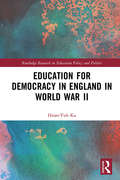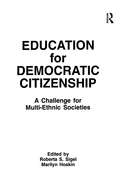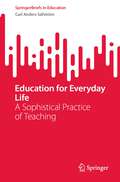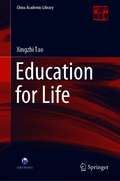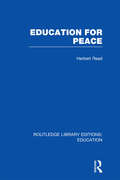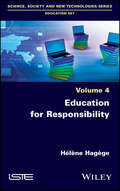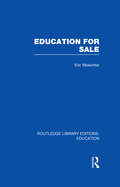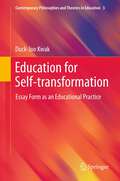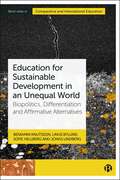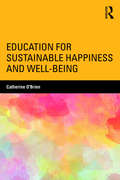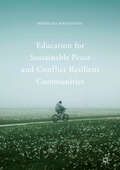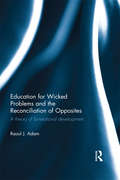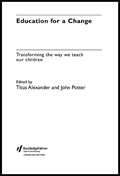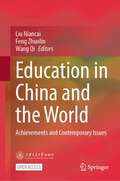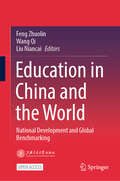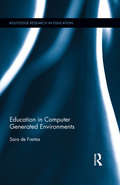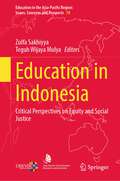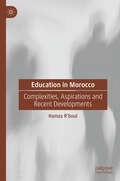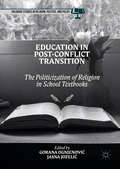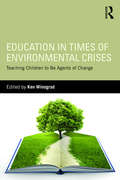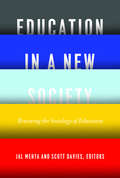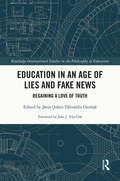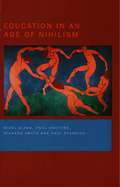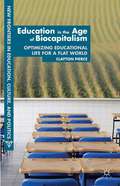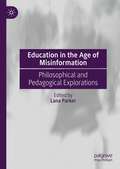- Table View
- List View
Education for Democracy in England in World War II (Routledge Research in Education Policy and Politics)
by Hsiao-Yuh KuEducation for Democracy in England in World War II examines the educational discourse and involvement in wartime educational reforms of five important figures: Fred Clarke, R. H. Tawney, Shena Simon, H. C. Dent and Ernest Simon. These figures campaigned for educational reforms through their books, publishing articles in newspapers, delivering speeches at schools and conferences and by organizing pressure groups. Going beyond the literature in this key period, the book focuses on exploring the relationship between democratic ideals and reform proposals in each figure’s arguments. Displaying a variety of democratic forums for debates about education beyond parliament, the book re-interprets wartime educational reforms from a different perspective and illustrates the agreements and contradictions in the educational discourse itself.
Education for Democratic Citizenship: A Challenge for Multi-ethnic Societies
by Roberta S. Sigel Marilyn HoskinIt is becoming increasingly clear that members of a host nation as well as newcomers have to learn what it means to live democratically in a multi-ethnic world and to accept diversity without fear or rancor. This volume, a result of a conference sponsored by the Spencer Foundation, asks a question of increasing significance in view of post World War II immigration patterns and the spread of democratic forms of government: "What can educational researchers and practitioners do to prepare our youth for cooperative, constructive living in a democracy?" This book illustrates how six post-industrial nations -- Canada, Germany, Israel, The Netherlands, the United Kingdom, and the United States -- have met or failed to meet this challenge.
Education for Everyday Life: A Sophistical Practice of Teaching (SpringerBriefs in Education)
by Carl Anders SäfströmThis book examines the role of teaching within public education. It critiques its function in today's educational policies and theories and establishes an alternative way of understanding teaching. It explores teaching from within a Sophist tradition of educational practice and thought.The first part of the book discusses the vital link between public education and democracy, the shifts in schooling's role in fostering competition and comparisons at the cost of social responsibility and democratisation. It identifies the driving force of those shifts as forces of aggression and destruction, central to a neoliberal ideology. The second part of the book argues for a practice of Sophistical teaching rather than Socratic teaching. It explores in-depth what it could mean to be teaching in an up-to-date sophist tradition of educational thought and practice.The book also includes insights for teaching to counter aggressive forces of nationalism, racism, and late capitalism's violence and the escalating climate crisis. Readers will be able to understand teaching within educational thought and precisely how different teaching forms can contribute to education as democratisation.
Education for Life (China Academic Library)
by Xingzhi TaoThis book is an anthology of English writing on education by Tao Xingzhi, the great Chinese educator and thinker. It includes several articles that represent his educational ideas and life philosophy, such as China in Transition, Creative Education, The Little Teacher and the Literacy Movement, and Education for All. These works are not only highly readable, but also present educational philosophies that are closely related to real life, and can be used to highlight and correct the deviations of strongly utilitarian educational concepts in modern society. Further, the appendix includes stories, fables, and poems translated by Tao Xingzhi, as well as his own poems written in Chinese and translated into English. This book offers readers interested in education’s new perspectives and inspiration. It also contributes to a more comprehensive and accurate understanding of Tao Xingzhi as well as his educational theories.
Education for Peace (Routledge Library Editions: Education #152)
by Herbert ReadThis book deals with the everlasting problem of war and peace. In it, the author argues that mankind must be predisposed for peace by the right kind of education and he discusses how to devise methods of education which will prevent war.
Education for Responsibility
by Hélène HagègeChanging your mind to change the world is the general principle proposed to educate for responsibility. Using an interdisciplinary scientific approach, this book dissects the functioning of the ego, that is to say the belief in a self, an illusion that causes disharmony. After an original modeling of the notion of responsibility, the author deduces that it is incumbent on all of us to become aware of the relationship between our own minds and the world. Thus, gaining consistency and awareness, everyone would have the potential to free themselves from the illusion of the ego and contribute to a more harmonious world. This book therefore proposes psychospiritual skills, favored in particular by different forms of reflexivity and by meditation (and mindfulness), which can serve as a basis for a curriculum to educate for responsibility. This academic connection between meditation and ethics is a major innovative contribution.
Education for Sale (Routledge Library Editions: Education)
by Eric MidwinterTeachers, schools and education authorities invariably hide their considerable lights and their public relations techniques are often inadequate for broadcasting the invaluable work accomplished in schools. This book offers clear-cut and highly –practical advice for every teacher from pre-school to sixth form on how to get the educational message across to parents. Over the past decades it has become an acute professional concern for teachers to involve parents as closely as possible in the educational process. The book acknowledges that educational salesmanship must be adapted to the cultural norms of its customers and that many teachers, because of their background and training, have reservations about their role as publicists. Set out here is a logical and orderly path of action to help everyone from the most extrovert to the most diffident.
Education for Self-transformation
by Duck-Joo KwakExemplifying what it advocates, this book is an innovative attempt to retrieve the essay form from its degenerate condition in academic writing. Its purpose is to create pedagogical space in which the inner struggle of 'lived experience' can articulate itself in the first person. Working through essays, the modern, 'post-secular' self can guide, understand, and express its own transformation. This is not merely a book about writing methods: it has a sharp existential edge. Beginning by defining key terms such as 'self-transformation', Kwak sketches the contemporary debates between Jürgen Habermas and Charles Taylor on the status of religious language in the public domain, and its relationship to secular language. This allows her to contextualize her book's central questions: how can philosophical practice reduce the experiential rift between knowledge and wisdom? How can the essay form be developed so that it facilitates, as praxis, pedagogical self-transformation? Kwak develops her answers by working through ideas of George Lukács and Stanley Cavell, of Hans Blumenberg and Søren Kierkegaard, whose work is much less familiar in this context than it deserves to be. Kwak's work provides templates for new forms of educational writing, new approaches to teaching educators, and new ways of writing methodology for educational researchers. Yet the importance of her ideas extends far beyond teaching academies to classroom teachers, curriculum developers - and to anyone engaged in the quest to lead a reflective life of one's own.
Education for Sustainable Development in an Unequal World: Biopolitics, Differentiation and Affirmative Alternatives (Bristol Studies in Comparative and International Education)
by Sofie Hellberg Jonas Lindberg Beniamin Knutsson Linus BylundEducation for Sustainable Development (ESD) is recurrently depicted as an enterprise that unites humanity in a common pursuit of a more just and sustainable world. But how is this enterprise pursued on a planet that is enormously unequal? Drawing on biopolitical theory and rich empirical data from different contexts around the world, this book explores how ESD is unpacked depending on whether people are rich or poor. The book demonstrates how ESD is adapted to the lifestyles and living conditions of different populations. The implication of this depoliticized sensitivity to local ‘realities’, the book argues, is that inequality becomes accommodated and that different responsibilities are assigned to rich and poor. Ultimately, the book considers alternatives to this biopolitical divide.
Education for Sustainable Happiness and Well-Being
by Catherine O'BrienIn this innovative and cogent presentation of her concept of sustainable happiness, Catherine O’Brien outlines how the leading recommendations for transforming education can be integrated within a vision of well-being for all. Solution-focused, the book demonstrates how aspects of this vision are already being realized, and the potential for accelerating education transitions that enable people and ecosystems to flourish. Each chapter assists educators to understand how to apply the lessons learned, both personally and professionally. The aim is to support educators to experience themselves as change-makers with growing confidence to implement new teaching strategies and inspire their students to become change-makers as well—engaged in deep learning that develops character, connections with life, and invigorating collaborations that revitalize the very purpose of education.
Education for Sustainable Peace and Conflict Resilient Communities
by Borislava ManojlovicThis book articulates a practice and theory of education that aims to facilitate the emergence of sustainable peace and conflict-resilient communities in societies plagued by conflict. It does so by examining the agency of conflict-resilient communities and the dynamic processes of their interactions with larger societal structure. Although education is seen as a human right, the design of education policies, schooling models and curricula has primarily been the prerogative of elites, be they governments, academics or international actors. This book argues for a different approach to education, contending for more inclusivity and open deliberation in modeling education frameworks. Drawing on case studies and interviews with practitioners, scholars, activists, and policymakers, it applies the lenses of conflict resolution to a variety of education issues within fragile societies.
Education for Wicked Problems and the Reconciliation of Opposites: A theory of bi-relational development
by Raoul J. AdamThe recognition and reconciliation of ‘opposites’ lies at the heart of our most personal and global problems and is arguably one of the most neglected developmental tasks of Western education. Such problems are ‘wicked’ in the sense that they involve real-life decisions that have to be made in rapidly changing contexts involving irreducible tensions and paradoxes. By exploring our human tendency to bifurcate the universe, Education for Wicked Problems & the Reconciliation of Opposites proposes a way to recognise and (re)solve some of our most wicked problems. Applying an original theory of bi-relational development to wicked problems, Adam proposes that our everyday ways of knowing and being can be powerfully located and understood in terms of the creation, emergence, opposition, convergence, collapse and trans-position of dyadic constituents such as nature/culture, conservative/liberal and spirit/matter. He uses this approach to frame key debates in and across domains of knowledge and to offer new perspectives on three of the most profound and related problems of the twenty-first century: globalisation, sustainability and secularisation. This book is a comprehensive study of dyads and dyadic relationships and provides a multidisciplinary and original approach to human development in the face of wicked problems. It will be of great interest to students and academics in education and psychosocial development as well as professionals across a range of fields looking for new ways to recognise and (re)solve the wicked problems that characterise their professions.
Education for a Change: Transforming the Way We Teach our Children
by John Potter Titus AlexanderThis challenging, hard-hitting book is about making schooling relevant to modern society. It starts from the premise that our present education system is ill equipped to serve students and society in the twenty-first century. In a series of positive yet powerful and provocative chapters, the authors look at critical issues shaping schools today, with a view to: * set out the critical issues behind the headlines* show evidence from research and examples of good practice* stimulate public debate and rigorous thinking about how we educate children for life in the twenty-first century* provide practical examples of learning for the future* present a vision for school transformation. With contributions from a range of leading commentators including Tim Brighouse, Jonathan Poritt, Anita Roddick, Charles Handy and Jonathan Sacks, this is a must-read for school leaders, teachers, policy-makers, parents and all education professionals.
Education in China and the World: Achievements and Contemporary Issues
by Qi Wang Niancai Liu Zhuolin FengThis open access book provides a comprehensive overview of education in China, covering 12 critical topics including basic education, higher education, professional education, STEM (Science, Technology, Engineering, and Mathematics) education, mental health education, and international education and excellence initiatives. Drawing from current research, theoretical literature, and real-life stories, this book examines the developmental trajectories, achievements, and best practices in the above-mentioned topics, to reflect realities of education transformation in China. It also incorporates a global comparison of key indicators to explore strengths of and gaps in Chinese education with its global counterparts. Setting its context in an ever-changing world, this book intends to explore conceptual support to develop “a modern education system with Chinese features and world standards”, to provide implications for further developing quality education in all sectors, and to promote understanding and inspire critical discussion on education development in China and around the world. This book serves as a valuable resource for students, scholars, and policy makers in the field of education studies, as well as for the general public who are interested in Chinese education.
Education in China and the World: National Development and Global Benchmarking
by Qi Wang Niancai Liu Zhuolin FengThis open access book is the second edition of Education in China and the World: Achievements and Contemporary Issues. It builds upon the commitment to provide a comprehensive analysis on education in China to a global audience. Focusing on seven education segments, from basic to post-secondary education, this edition draws on the latest literature, official data, and statistical resources to reflect the trends and development in Chinese education. Based on the groundwork built previously, this edition further explores the excellence index to assess Chinese education as compared to its international counterparts. It also provides updated influential case studies of educational practices and inspiring educators and renews a comprehensive literature review on current research and national policy, to support the development of a modern education system with Chinese characteristics and global standards. The featured analysis in this edition highlights China’s significant growth in education attainment and research output, underscored by substantial government support. Concurrently, the analysis also reveals disparities in quality performance, particularly in educational resource allocation. It calls for further efforts to promote academic excellence and to address public educational needs comprehensively. This book serves as a valuable resource for students, scholars, and policy makers in the field of education studies, as well as readers who are interested in Chinese education.
Education in Computer Generated Environments (Routledge Research in Education #104)
by Sara de FreitasThis book examines the implications of computer-generated learning for curriculum design, epistemology, and pedagogy, exploring the ways these technologies transform the relationship between knowledge and learning, and between teachers and students. It argues that these technologies and practices have the potential to refocus on the human factors that are at the center of the learning process.
Education in Indonesia: Critical Perspectives on Equity and Social Justice (Education in the Asia-Pacific Region: Issues, Concerns and Prospects #70)
by Zulfa Sakhiyya Teguh Wijaya MulyaThis book offers a critical analysis on Indonesian education by drawing from various critical perspectives and theoretical frameworks to explore persistent challenges and social inequality problems in the education sector. Critical perspectives are important to reveal how education is not a neutral, mechanistic process of cultivating the knowledge and skills of future generation. Instead, it is a battleground in which competing visions, ideologies, discourses, religious values, and political interests struggle for dominance in a given society. In each of the sections, contributors draw upon specific case studies and employ critical theories to analyze power relations or to identify and destabilize underlying structures, dominant discourses, hegemonic knowledge, policies, or practices. Some authors also highlight data evidencing inequities, inequalities, or injustices in Indonesian education system. As a handbook, the emphasis on critical perspectives is useful to identify and evaluate the ‘blind spots’ of dominant policy discourses and their pedagogical consequences. The plurality of critical approaches also means that this book is necessarily multidisciplinary. A unique feature of this book is the fact that most authors are Indonesian academics who bring with them tacit knowledge of practices and issues. Overall, this book enriches the literature by bringing together different disciplinary perspectives such as political science, psychology, international relations, economics, and linguistics to critically examine important issues related to education in Indonesia.
Education in Morocco: Complexities, Aspirations and Recent Developments
by Hamza R'boulThis book provides a comprehensive overview of historical and postmodern developments in the Moroccan education system, in order to construct a deeper understanding of its structural, linguistic and epistemic complexities. The chapters provide readers with a nuanced grasp of education and its intersections with wider geopolitical, sociopolitical and sociocultural conditions in Morocco as a postcolonial Southern country which is actively seeking to consolidate its position internationally. Covering education from primary school to university, the book features critical reflections on topics such as language-in-education, policy and planning, the politics of education, globalization and nationalist rhetoric. The book is an important reference for anyone interested in understanding the complexities of the education system in Morocco, and more specifically students and scholars who are interested in the sociology of education as well as education and language policy and planning.
Education in Post-Conflict Transition
by Gorana Ognjenović Jasna JozelićThis book offers vivid insights into policies of religious education in schools since the series of wars in former Yugoslavia in the 1990's. It traces the segregation among members of different ethnic groups in Slovenia, Bosnia-Herzegovina, Croatia, and Serbia, which has never been greater or more systematic. It aims to be a necessary step in understanding the origins of this systematic segregation and how it is reproduced in educational practice, asserting that the politicization of religion in the school textbooks is one of the motors responsible for the ongoing ethnic segregation. It also deals with complex aspects of this issue, such as the general situation of religion in the different countries, the social position of churches, the issues of gender, the reconciliation after the Yugoslav Wars, and the integration of the EU.
Education in Times of Environmental Crises: Teaching Children to Be Agents of Change
by Ken WinogradThe core assumption of this book is the interconnectedness of humans and nature, and that the future of the planet depends on humans’ recognition and care for this interconnectedness. This comprehensive resource supports the work of pre-service and practicing elementary teachers as they teach their students to be part of the world as engaged citizens, advocates for social and ecological justice. Challenging readers to more explicitly address current environmental issues with students in their classrooms, the book presents a diverse set of topics from a variety of perspectives. Its broad social/cultural perspective emphasizes that social and ecological justice are interrelated. Coverage includes descriptions of environmental education pedagogies such as nature-based experiences and place-based studies; peace-education practices; children doing environmental activism; and teachers supporting children emotionally in times of climate disruption and tumult. The pedagogies described invite student engagement and action in the public sphere. Children are represented as ‘agents of change’ engaged in social and environmental issues and problems through their actions both local and global.
Education in a New Society: Renewing the Sociology of Education
by Jal Mehta Scott DaviesIn recent decades, sociology of education has been dominated by quantitative analyses of race, class, and gender gaps in educational achievement. And while there’s no question that such work is important, it leaves a lot of other fruitful areas of inquiry unstudied. This book takes that problem seriously, considering the way the field has developed since the 1960s and arguing powerfully for its renewal. The sociology of education, the contributors show, largely works with themes, concepts, and theories that were generated decades ago, even as both the actual world of education and the discipline of sociology have changed considerably. The moment has come, they argue, to break free of the past and begin asking new questions and developing new programs of empirical study. Both rallying cry and road map, Education in a New Society will galvanize the field.
Education in an Age of Lies and Fake News: Regaining a Love of Truth (Routledge International Studies in the Philosophy of Education)
by Jānis John Tālivaldis Ozoliņš João J. Vila-ChãThe ‘post-truth’ world in which we live has been beset by fake news, lies and a cavalier disregard for truth. If truth is neglected then an alternative is an appeal to the emotions in order to validate a particular position, which can quickly turn to the use of power to impose a particular view. The loss of truth results in the loss of freedom. This book contends that if we want to preserve our freedom then we have a serious obligation to pursue truth. One way to do this is through an adequate moral education. Education in an Age of Lies and Fake News: Regaining a Love of Truth makes an argument for the importance of truth. It explores how we can retrieve the concept of truth and how moral education can be deployed in order to re-establish a commitment to truth. It introduces Eastern perspectives on the question of truth and how we view reality, and presents a realist position on the nature of truth as a counter to scepticism, drawing on Augustine and Thomas Aquinas, amongst others. Further, the chapters are mindful of the significance of developing a pedagogy which not only enables students to be critical thinkers, but to foster a genuine concern for truth and for its pursuit. This book will be essential reading for students, educators, philosophers and researchers pursuing the question of truth in the modern age.
Education in an Age of Nihilism: Education and Moral Standards
by Richard Smith Paul Smeyers Paul Standish Nigel BlakeThis book addresses concerns about educational and moral standards in a world increasingly characterised by nihilism. On the one hand there is widespread anxiety that standards are falling; on the other, new machinery of accountability and inspection to show that they are not. The authors in this book state that we cannot avoid nihilism if we are simply laissez-faire about values, neither can we reduce them to standards of performance, nor must we return to traditional values. They state that we need to create a new set of values based on a critical assessment of contemporary practice in the light of a number of philosophical texts that address the question of nihilism, including the work of Nietzsche.
Education in the Age of Biocapitalism
by Clayton Pierce"This book is an in-depth examination of the growing alignment between powerful global bioindustries and education reform in the U. S. Utilizing a biopolitical methodology, the book focuses on how value-added measures and other neoliberal strategies embedded in policies such as 'race to the top' are involving schools in a project to manage and regulate educational life for competing in a new 'flat world'. Understanding the educational present, this work argues, requires individuals to consider what advanced industrialized nations across the globe are viewing as the future. Biocapitalist development in areas such as genetic engineering, drug therapies, and cellular cloning is the promissory future driving nations like the U. S. to out-compete and out-educate one another at any cost. This book assesses the implications for education in the biocapitalist era and points to alternative futures not based on such a vision of life and its productive potential"--
Education in the Age of Misinformation: Philosophical and Pedagogical Explorations
by Lana ParkerThis edited volume examines the implications of misinformation and youth digital life in a new information environment. This new information environment is characterized by high levels of user engagement, hidden algorithmic manipulations, and information abundance, including misinformation and disinformation. While misinformation and disinformation in the post-truth era have been previously investigated, this edited volume offers a distinctive educational focus that scholars have not yet addressed. Chapters contribute to the ongoing discussion of the role of education in democracies while uniquely contextualizing the problem of misinformation as a pedagogical opportunity. Contributions from across the globe answer the question of how education might respond to the changing information environment through engagements with educational philosophy, democracy, and everyday practices of teaching and learning. The book adds to a growing body of work exploring what it means to engage in responsive, rather than reactive or stagnant, pedagogy.
